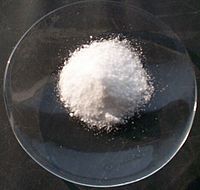Potassium chloride
 |
|
 |
|
| Names | |
|---|---|
| Other names
Sylvite
Muriate of potash |
|
| Identifiers | |
|
7447-40-7 |
|
| 3D model (Jmol) | Interactive image |
| ChEBI |
CHEBI:32588 |
| ChEMBL |
ChEMBL1200731 |
| ChemSpider |
4707 |
| DrugBank |
DB00761 |
| ECHA InfoCard | 100.028.374 |
| E number | E508 (acidity regulators, ...) |
| KEGG |
D02060 |
| PubChem | 4873 |
| RTECS number | TS8050000 |
| UNII |
660YQ98I10 |
|
|
|
|
| Properties | |
| KCl | |
| Molar mass | 74.5513 g·mol−1 |
| Appearance | white crystalline solid |
| Odor | odorless |
| Density | 1.984 g/cm3 |
| Melting point | 770 °C (1,420 °F; 1,040 K) |
| Boiling point | 1,420 °C (2,590 °F; 1,690 K) |
| 21.74% (0 °C) 25.39% (20 °C) 36.05% (100 °C) |
|
| Solubility | Soluble in glycerol, alkalies Slightly soluble in alcohol Insoluble in ether |
| Acidity (pKa) | ~7 |
| −39.0·10−6 cm3/mol | |
|
Refractive index (nD)
|
1.4902 (589 nm) |
| Structure | |
| face centered cubic | |
| Fm3m, No. 225 | |
|
a = 629.2 pm
|
|
| Octahedral (K+) Octahedral (Cl−) |
|
| Thermochemistry | |
|
Std molar
entropy (S |
83 J·mol−1·K−1 |
|
Std enthalpy of
formation (ΔfH |
−436 kJ·mol−1 |
| Pharmacology | |
| A12BA01 (WHO) B05XA01 (WHO) | |
|
|
| Oral, IV, IM | |
| Pharmacokinetics: | |
| Renal: 90%; Fecal: 10% | |
| Hazards | |
| Safety data sheet | ICSC 1450 |
| NFPA 704 | |
| Flash point | Non-flammable |
| Lethal dose or concentration (LD, LC): | |
|
LD50 (median dose)
|
2600 mg/kg (oral, rat) |
| Related compounds | |
|
Other anions
|
Potassium fluoride Potassium bromide Potassium iodide Potassium astatide |
|
Other cations
|
Lithium chloride Sodium chloride Rubidium chloride Caesium chloride Francium chloride |
|
Related compounds
|
Potassium chlorate Potassium perchlorate |
|
Except where otherwise noted, data are given for materials in their standard state (at 25 °C [77 °F], 100 kPa).
|
|
|
|
|
| Infobox references | |
Potassium chloride (KCl) is a metal halide salt composed of potassium and chloride. It is odorless and has a white or colorless vitreous crystal appearance. The solid dissolves readily in water and its solutions have a salt-like taste. KCl is used as a fertilizer, in medicine, scientific applications, food processing, and used to cause cardiac arrest as the third drug in the "three drug cocktail" for executions by lethal injection. It occurs naturally as the mineral sylvite and in combination with sodium chloride as sylvinite.
The version for injection is on the World Health Organization's List of Essential Medicines, the most important medications needed in a basic health system.
The majority of the potassium chloride produced is used for making fertilizer, since the growth of many plants is limited by their potassium intake. As a chemical , it is used for the manufacture of potassium hydroxide and potassium metal. It is also used in medicine, lethal injections, scientific applications, food processing, and as a sodium-free substitute for table salt for persons concerned about the health effects of sodium.
...
Wikipedia

